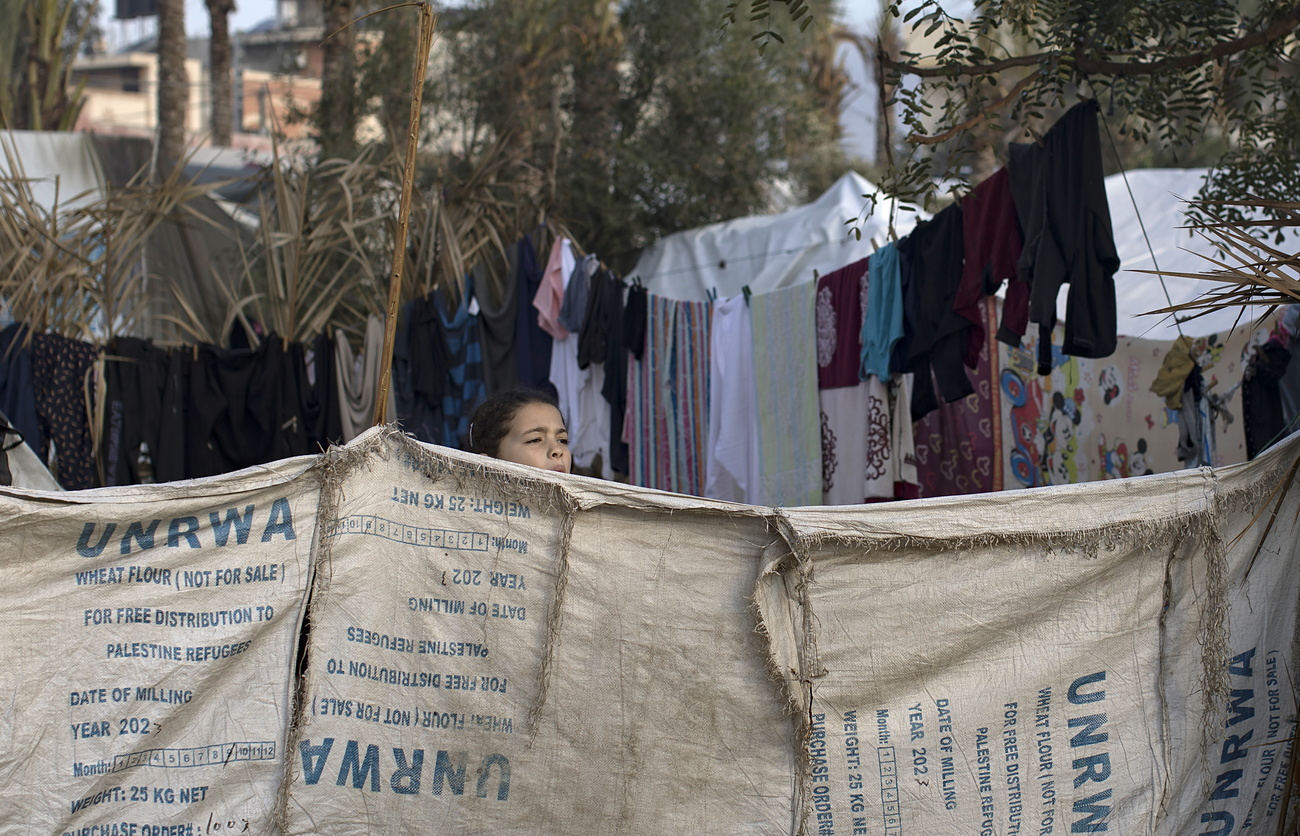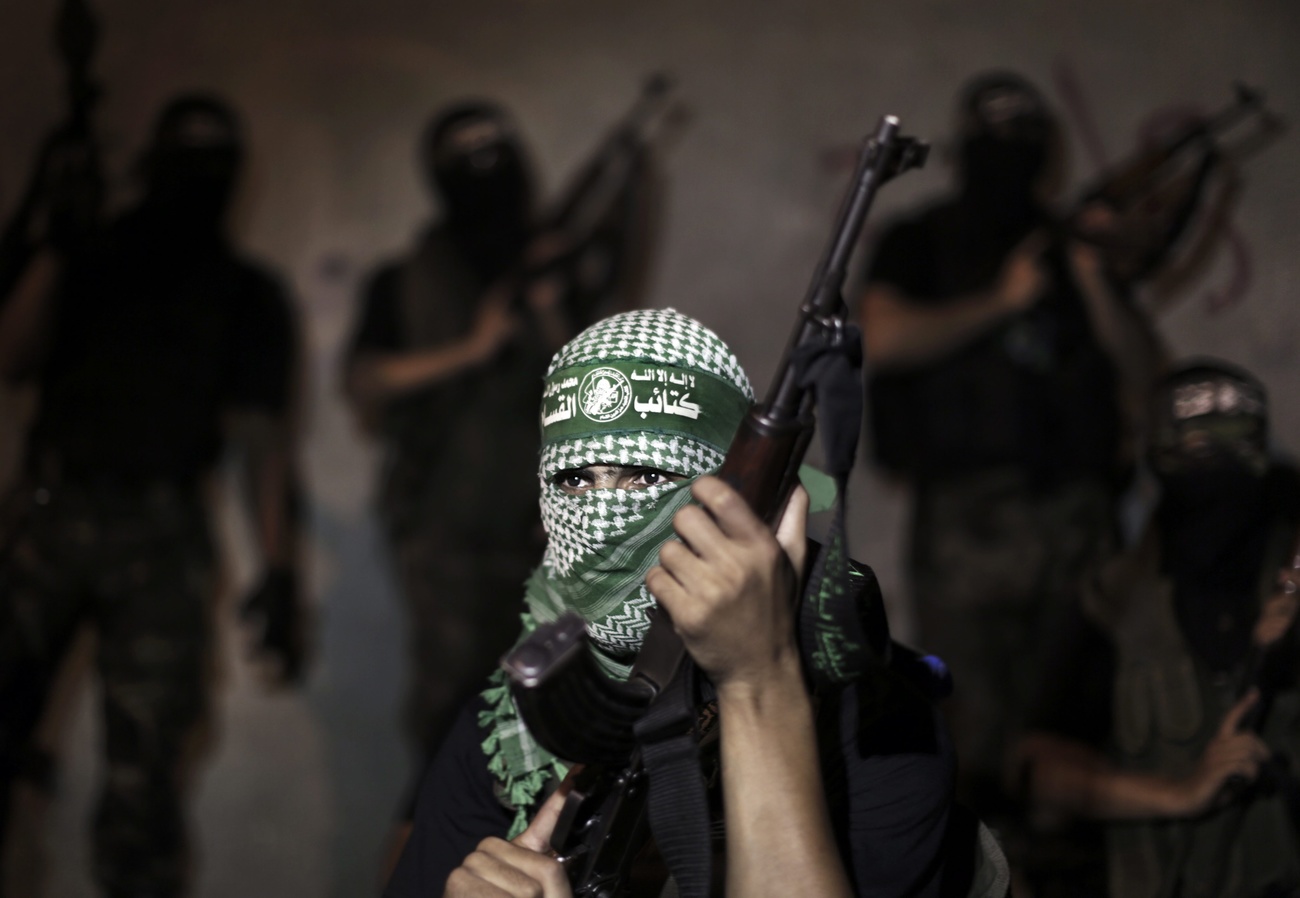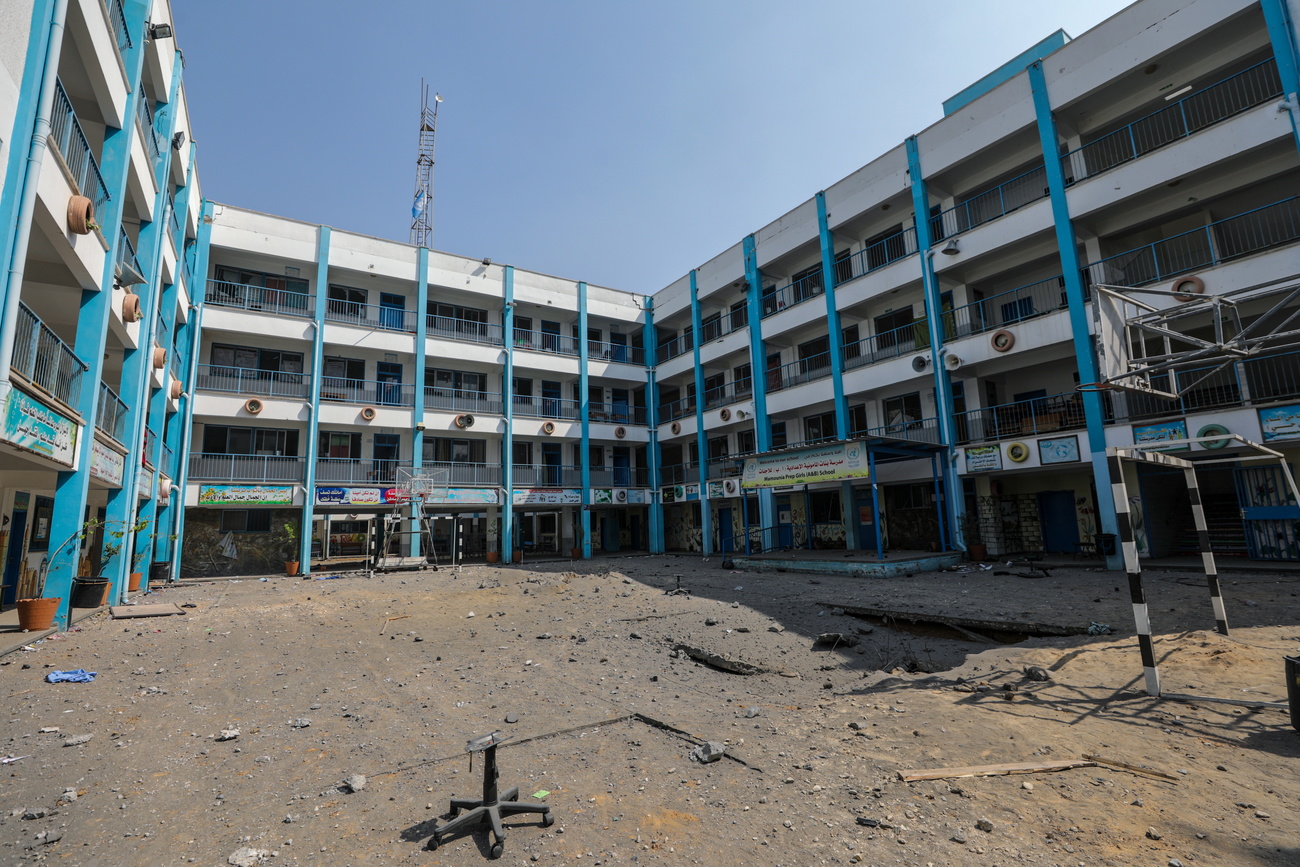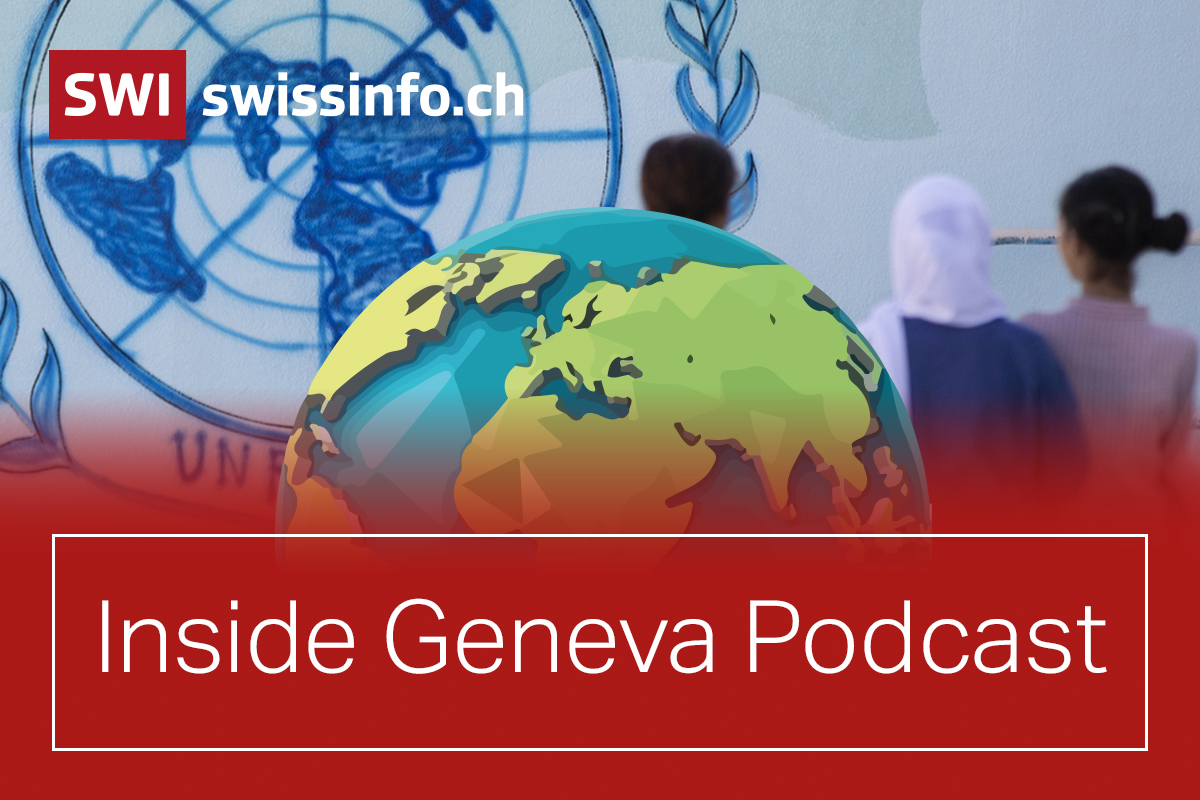What are the allegations upending UNRWA’s aid efforts in Gaza?

Pressure to dismantle the UN agency for Palestinian refugees is mounting. Israel alleges that UNRWA colludes with the Islamist movement Hamas and donors like Switzerland are withholding funding for the agency. SWI swissinfo.ch takes a closer look at the allegations.
This week, as the 55th UN Human Rights Council got underway in Geneva, UN Watch, a pro-Israeli Swiss NGO that monitors the UN system, held a parallel summit nearby. It had just one topic on the agenda: replacing UNRWA, the main humanitarian organisation delivering aid in Gaza.
Since the October 7 Hamas attack against Israel, UNRWA has faced a series of damaging claims. The most serious of them emerged in late January: 12 staff of the agency, Israel alleges, took part in the assault. UNRWA immediately terminated the employees’ contracts and the UN opened an investigation.
Although Israel has yet to provideExternal link written evidence to the UN on its accusation and UNRWA refutes claims that it has links to Hamas, calls to defund the agency are multiplying.
“The Israeli leadership have been quite clear that they want it to knock off,” says Daniel Forti, a senior analyst at the International Crisis Group. Dismantling the UN agency is now part of Israel’s planExternal link for managing Gaza once its war with Hamas – launched after the October 7 attack – is over.
The impact of the allegation has been profound: several of the agency’s biggest donors suspended funding as trust in UNRWA suddenly eroded. It’s now short of roughly half of its $880 million (CHF774 million) budget as it copes with an unprecedented humanitarian emergency in Gaza.
Is UNRWA a political or humanitarian organisation?
UNRWA was established by the UN General Assembly to provide humanitarian assistance to Palestinians who fled their homes in the wake of Israel’s war of independence in 1948. It offers basic services such as healthcare to roughly 5.9 million Palestinian refugees in Gaza, the West Bank, East Jerusalem, Jordan, Syria and Lebanon.
But UN Watch executive director Hillel Neuer sees the organisation through another lens: “UNRWA’s purpose is not humanitarian, but political”, he alleges in an email to SWI swissinfo.ch.
Forti explains that the desire to get rid of UNRWA is wrapped in the political symbolism attached to it. “To some, UNRWA is seen as a sort of guarantee from the international community that one day Palestinians will have a right to return to their homelands as part of any negotiation around a two-state solution,” he says. “For those same reasons, Israel sees UNRWA as a legitimate challenge to its statehood.”
The idea of closing down UNRWA – something only the UN General Assembly can do – is gaining ground. UN Watch claims that 12,000 people participated in its one-day summit online and in person, although Le Temps reportedExternal link attendance at the venue was “thin, made up mainly of the converted.” More than 140,000 people have signed a UN Watch online petition to get rid of UNRWA, Neuer says.
Does UNRWA support Hamas?
Neuer and others have lobbied for the end of UNRWA by claiming the agency harbours terrorists. Israel alleges that 10% of the agency’s roughly 13,000 workers in Gaza have tiesExternal link to Hamas, which several countries like the United States have labelled a terrorist entity. Altogether UNRWA employs over 30,000 people across the region.

More
Switzerland mulls five-year ban on Hamas as terror group
The organisation has cast doubt on this claim. UNRWA head Philippe Lazzarini says that, since taking the helm in 2020, he had never heard Israel express concerns about its workers. The agency shares its list of employees with Israel each year. “When we ask the Israeli authorities where this 10% figure comes from and what the evidence is, we don’t get an answer,” he toldExternal link Le Temps.
Reached by email, the Israeli embassy in Bern indicated that Israel did share the names of “Hamas operatives” working for UNRWA with the agency – not recently, but back in 2011 and 2012 – and that the latter took no action. A US intelligence report issued in February found a lack of evidence to show that UNRWA has broad links to Hamas, the Wall Street Journal reportsExternal link.
Pierre-André Page, a Swiss People’s Party parliamentarian and member of the foreign affairs committee, toldExternal link Swiss public radio RTS in January that “we have evidence” UNRWA gave money to Hamas. When asked about this evidence, Page did not comment but said instead, in an email to SWI swissinfo.ch, that the committee will hear from UNRWA head Philippe Lazzarini at a hearing in late March. “I hope he will provide us with important and precise information,” he said.
Having contact with Hamas, which has controlled Gaza since 2007, is inevitable for UNRWA as a provider of services to residents, says Forti. But, he adds, the agency has been very careful to keep this cooperation strictly to a technical level, “in a way that safeguards the agency’s neutrality and protects its mandate of operations.”
Lazzarini acknowledged in Le Temps that his agency operates in “an extremely complex environment … where it’s difficult to have zero risk.” To better cope in this environment, a month before the allegations against the 12 staff emerged, the UN ordered an independent review to delve into UNRWA’s recruitment processes and responses to staff misconduct. A final report is expected in April.
Does UNRWA teach anti-Semitism?
Another allegation lobbed at UNRWA is that its schools promote violence. In Bern, where the Swiss parliament recently reviewed a proposal to cut funding to the agency, members of the right-wing Swiss People’s Party cited reports by IMPACT-se, a British-Israeli education watchdog that has long accusedExternal link UNRWA of teaching hatred towards Israel.

More
To cut or not? Swiss parliament divided on UNRWA aid
“What we saw on October 7 is directly connected to the school curriculum,” IMPACT-se CEO Marcus Sheff told CNN in January. Similarly, UN Watch allegesExternal link that UNRWA teachers celebrated the Hamas attack, which killed 1,200 people, in a Telegram chat group. In response, the agency saidExternal link it was impossible to verify if all 3,000 members of the chat were UNRWA employees.
Lazzarini has previously claimed that UN Watch and IMPACT-se peddle disinformation. Jo Kelcey, a postdoctoral fellow at the Lebanese American University in Beirut who wrote her PhD thesis on UNRWA’s education programme, contends that these groups’ reports “are characterised by polemic rather than research.” An independent review of textbooks done in 2021 by the Georg Eckert Institute in Germany, she points out, found claims made by IMPACT-se contained “exaggerated conclusions based on methodological shortcomings”.
UNRWA schools, which teach some 540,000 Palestinian children in the region, use host governments’ textbooks and teach an accredited curriculum.
“It’s probably the most studied and evaluated curriculum in the world – the number of studies and reviews exceeds anything else I’ve seen,” says Kelcey. But some studies have identified problems. The Georg Eckert Institute, for example, foundExternal link that, while books used by UNRWA adhere to UNESCO standards on political education and human rights, some of them contain anti-Semitic narratives. The UN agency hasExternal link said it addressed issues that have been flagged in the past and regularly reviews school content.

The vast majority of funding from UNRWA’s largest donor, the United States, goes to education. The US was among the 16 donors that suspended funds for the agency in recent weeks.
Could other aid agencies replace UNRWA?
UNRWA, Neuer tells SWI, could “gradually be replaced by other UN agencies, for example those that are now addressing the humanitarian needs of more than 20 million people in Sudan.”
But to argue this is to misunderstand the roles of UN organisations, says Kelcey: the refugee agency UNHCR, often cited as a replacement for UNRWA, does not have a mandate to work in areas under occupation or to deliver extensive health and education services.

More
Inside Geneva: what’s the future of UNRWA?
“It’s not a like-for-like replacement,” Forti agrees. “UNRWA plays an invaluable role right now for humanitarian aid.” A significant scaling back of its operations, he believes, would increase the risk of instability in the entire immediate region. And getting rid of UNRWA would not even be in Israel’s interest, he adds, since it would have to guarantee basic services to Palestinian refugees now offered by the agency.
Will UNRWA survive this crisis?
In Gaza, where over 2 million people rely on humanitarian assistance, UNRWA says it has enough funds for just another month of operations and warns of a looming famine on the territory. It’s urgently calling on donors to resume funding. Switzerland, UNRWA’s ninth-biggest donor by 2022 figures, is withholding CHF20 million until the results of the UN investigation and the independent review are released.
“It’s very hard to conceive of this region, but also this specific moment, without UNRWA,” says Kelcey. “It’s hard to conceive of how much worse that would be if the agency can’t continue.” Donors like Ireland, Belgium, Spain, Norway and Kuwait are continuing to fund the organisation and reaffirming their trust in it, a sign that the researcher sees as hopeful.
Edited by Virginie Mangin/livm/ac

In compliance with the JTI standards
More: SWI swissinfo.ch certified by the Journalism Trust Initiative











You can find an overview of ongoing debates with our journalists here . Please join us!
If you want to start a conversation about a topic raised in this article or want to report factual errors, email us at english@swissinfo.ch.